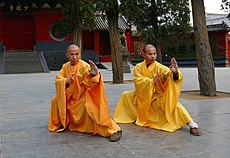
Back Wuxia AST Usya AZ Wuxia Catalan Wu-sia Czech Wuxia German Wuxia Spanish Wuxia EU ووشیا FA Wuxia Finnish Wuxia French
This article needs additional citations for verification. (February 2013) |
| Part of a series on |
| Chinese martial arts (Wushu) |
|---|
 |
| Wuxia | |||||||||||||||||||||||||||||||||||||||||||||||||||||||||||||||||||||
|---|---|---|---|---|---|---|---|---|---|---|---|---|---|---|---|---|---|---|---|---|---|---|---|---|---|---|---|---|---|---|---|---|---|---|---|---|---|---|---|---|---|---|---|---|---|---|---|---|---|---|---|---|---|---|---|---|---|---|---|---|---|---|---|---|---|---|---|---|---|
| Traditional Chinese | 武俠 | ||||||||||||||||||||||||||||||||||||||||||||||||||||||||||||||||||||
| Simplified Chinese | 武侠 | ||||||||||||||||||||||||||||||||||||||||||||||||||||||||||||||||||||
| |||||||||||||||||||||||||||||||||||||||||||||||||||||||||||||||||||||
Wuxia (武俠 [ù.ɕjǎ], literally "martial arts and chivalry") is a genre of Chinese fiction concerning the adventures of martial artists in ancient China. Although wuxia is traditionally a form of historical fantasy literature, its popularity has caused it to be adapted for such diverse art forms as Chinese opera, manhua, television dramas, films, and video games. It forms part of popular culture in many Chinese-speaking communities around the world. According to Hong Kong film director, producer, and movie writer Ronny Yu, wuxia movies are not to be confused with martial arts movies.[1]
The word "wǔxiá" is a compound composed of the elements wǔ (武, literally "martial", "military", or "armed") and xiá (俠, literally "chivalrous", "vigilante" or "hero"). A martial artist who follows the code of xia is often referred to as a xiákè (俠客, literally "follower of xia") or yóuxiá (遊俠, literally "wandering xia"). In some translations, the martial artist is referred to as a jiànxiá (劍俠) or jiànkè (劍客), either of which can be interpreted as a "swordsman" or "swordswoman", even though they may not necessarily wield a sword.
The heroes in wuxia fiction typically do not serve a lord, wield military power, or belong to the aristocratic class. They often originate from the lower social classes of ancient Chinese society. A code of chivalry usually requires wuxia heroes to right and redress wrongs, fight for righteousness, remove oppressors, and bring retribution for past misdeeds. Chinese xia traditions may be compared to martial codes from other cultures, such as the Japanese samurai bushidō.